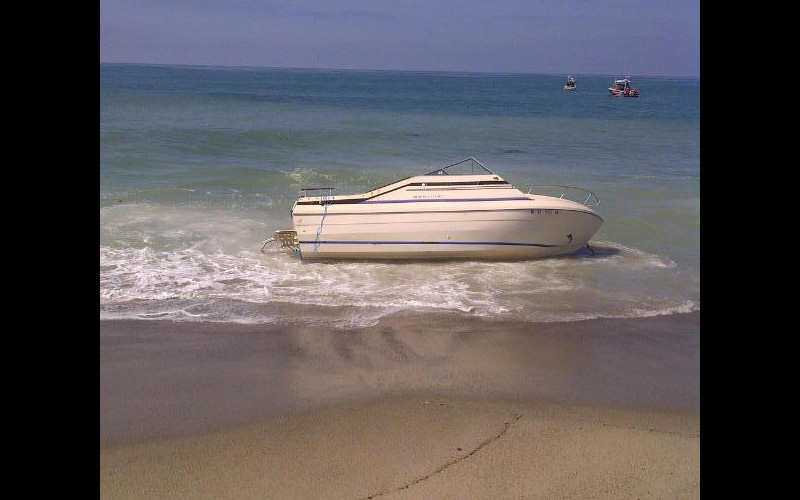Archived Content
In an effort to keep ICE.gov current, the archive contains content from a previous administration or is otherwise outdated. This information is archived and not reflective of current practice.
Mexican man convicted of smuggling aliens into US in cabin cruiser
SANTA ANA, Calif. — A Mexican man who attempted to smuggle seven illegal aliens, including a convicted felon, into the U.S. aboard a cabin cruiser that ran aground near San Clemente last September faces up to 90 years in prison following his conviction in federal court here Thursday.
Jesus Quinones-Chavez, 57, of Torreon, Coahuila, Mexico, is scheduled to be sentenced Sept. 30. A jury deliberated less than five hours before finding Quinones-Chavez guilty on all nine felony counts contained in the original case indictment, including conspiring to bring aliens into the U.S.; bringing aliens into the U.S. for financial gain; and aiding an aggravated felon with entering the U.S. The case was investigated by U.S. Immigration and Customs Enforcement's (ICE) Homeland Security Investigations (HSI) and prosecuted by the U.S. Attorney's Office for the Central District of California.
Thursday's verdict followed a six-day trial in which witnesses recounted how the 24-foot Bayliner piloted by Quinones-Chavez embarked from Mexico on Sept. 15, 2012. But when the vessel was about 20 miles from Oceanside, it ran out of fuel, stranding Quinones-Chavez and the seven other illegal aliens on board. According to evidence presented at the trial, the defendant threatened to riddle his passengers with bullets if they called police while they waited for a refueling boat to arrive. Quinones-Chavez also threatened the passengers if the group got caught and they identified him as the boat's pilot.
After being stranded at sea for a day, a vessel arrived from Oceanside and provided Quinones-Chavez with sufficient fuel to complete the trip. Still, the Bayliner experienced engine trouble as it approached the Southern California coastline, causing it to fall short of its intended destination, Newport Beach. Quinones-Chavez chose to land the boat in the Cypress Shore area of San Clemente. During the rough landing, one of the passengers was injured when he jumped off of the vessel and required hospitalization.
The ensuing probe by investigators with the HSI-led Los Angeles Border Enforcement Security Task (BEST) Force revealed the Bayliner's passengers were being charged fees ranging from $7,000 to $12,000 each to be smuggled from Puerto Nuevo, Baja California, to Southern California.
So far this fiscal year (Oct. 1, 2012, through May 24, 2013), there have been 137 occurrences of maritime smuggling in Southern California, compared to 128 incidents during the same period last year. The LA BEST and HSI are working closely with the U.S. Attorney's Office and local district attorneys to identify and prosecute those involved in this dangerous enterprise. In the first eight months of this fiscal year, there have been 47 indictments stemming from maritime smuggling incidents and a total of 90 criminal convictions.
Maritime security efforts off the California coastline are being overseen by the Department of Homeland Security's Los Angeles-Long Beach Regional Coordinating Mechanism. The group is comprised of HSI; U.S. Customs and Border Protection; the U.S. Coast Guard; and several state and local law enforcement agencies. The state and local partners include the California Highway Patrol; the California Department of Parks and Recreation; the sheriff's departments of Orange, Los Angeles, Ventura, Santa Barbara and San Luis Obispo counties; and the Los Angeles and Long Beach police departments. The group is also receiving substantial assistance from members of the California National Guard's Counterdrug Program.


